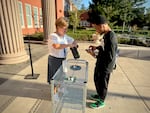
Students gather outside Grant High School in Portland on Wednesday, Aug. 28, 2024. Students have to check their Yondr cellphone restriction pouches before entering the building, which is new this year.
Natalie Pate / OPB
Schools across Oregon — and the U.S. — are grappling with a key question this year: What do we do about cellphones?
One school in Northeast Portland is trying out a possible solution.
Roughly 2,000 students entered Grant High School Wednesday morning for the first full day of the school year. As they approached the school’s entrance, they had to stop at one of two stations.
The first was staffed by Vice Principal Jessika Magnett. She stood near a wired, rolling cart with two silver bases. Students walked up, took out small, gray pouches, each with a unique number written on it, and touched them to the bases. They pressed on the magnetized lock at the top so it popped open. Then, students put their phones, earbuds and smartwatches in the Yondr pouch to lock them for the rest of the day.
At the entrance of the building itself, just a few feet away, Vice Principal Jonathan Harris checked to make sure students’ pouches were present and locked.

Ava McCandless, a junior at Grant High School, shows her Yondr cellphone pouch out front of the Northeast Portland school on Wednesday, Aug. 28, 2024. Students will lock their phones, earbuds and smartwatches in the pouches at the start of the school day and get them opened at the end.
Natalie Pate / OPB
Portland Public Schools is developing a districtwide cellphone policy that will further restrict students’ use of personal smart devices during the school day. Administrators at Grant are implementing their own system to control devices in the meantime.
“My job as a principal is to create the conditions where our teachers can do their best teaching, where our students can do their best learning,” said Principal James McGee, adding that phones can cause distractions in the classroom and cyberbullying that often follows students home. He also mentioned students ordering food through Uber Eats in the middle of class and leaving to retrieve it.
“The reality is, we’ve allowed them to normalize some of these problematic behaviors,” McGee said. “And so, I mean, at least at Grant, enough is enough.”
Proponents believe the change will reduce these problematic behaviors and improve students’ mental health and academic success. Critics say the restrictions go too far, cost too much money or make daily logistics and emergencies difficult to navigate. The Yondr pouches are estimated to cost $25 to $30 per student.
The school board is taking the next several months to get feedback from students, staff and families before finalizing a policy for the entirety of Oregon’s largest school district.

Vice Principal Jessika Magnett helps students with their Yondr cellphone pouches outside Grant High School in Portland on Wednesday, Aug. 28, 2024. It was the first day of school for the entire student body after ninth graders got a jump-start day on Tuesday.
Natalie Pate / OPB
Other schools, including Beaumont Middle School and Cleveland High School, will also have increased restrictions this school year. These two, along with Grant, are expected to serve as focus groups to inform the policy committee’s decisions for the district.
OPB spoke with Grant high schoolers Wednesday morning — the first day of the new school year for all grades — and asked how they feel about the added restrictions on mobile devices.
Here are some students’ thoughts, edited for length and clarity:
Ava McCandless, junior: “I think it’s a little much. They could have done it a lot better by, like, letting you unlock it at lunch. And I’m also worried about sports and stuff — communicating with our coaches. Because with me, for softball, we communicate a lot, and I don’t think you can just say all of that over [the] overhead speaker.
“I definitely think it’s going to work for a bit, for sure. … I can’t focus very well in class, so I think it’ll help me a lot for focusing because there’s nothing else to do but work. But it’s also really stressful because I use music as a coping [mechanism] for school, and so that’s gonna be kind of rough.
“If you get better grades, then I don’t think you can really hate on it because it’s helping you out. But … my main thing is, we should have it at lunch.”
Emma Plaza, junior: “They said that if there’s an emergency, or we need to contact our parents, we go to the office. But I feel like, if it’s personal stuff, I don’t want to go to the office about that, you know? If something’s happening, and I need to talk to my mom, it’s not something I can do. …
“But I think if we don’t have our phones, [bullying] could be better. And for me, I’m gonna be honest, I used to skip class a lot because I knew my friends were out of class because of my phone. So, now that I don’t have it, I don’t have a reason [to skip].”
James Cunningham, junior: “I think it’s perfectly fine. It gives a lot more bonuses than negatives. I think I’ve seen studies that say it works. So if it works, it works. It’ll probably bring an increase in GPAs and graduation rates. A lot of people use their phones during class, so now taking away that option would bring a lot more improvements to them.”

A student unlocks their Yondr pouch outside Grant High School on Wednesday, Aug. 28, 2024. The new pouches are supposed to keep phones, earbuds and smartwatches away from students for the full school day, including lunch and passing periods.
Natalie Pate / OPB
Quinn Marcoux, junior: “It’s just a lot different than what we had before, and I think it could pose some problems. It’s very restrictive, especially if there’s an emergency, like a school shooter, it could be a problem.
“I think one thing that is often overlooked is that this is a big school. We have, what, 2,200 some-odd students here? And during lunch, it can be hard to find people, especially, you know, on the first day, and phones really help with that. So, I feel like it could be a problem finding my friends in the hallways because it’s a big school.”
Siobhan Marcoux, sophomore: “I think that, generally, it’s just too restrictive. Obviously, … we shouldn’t have phones during class, like, we need to be able to focus and do our work, but it’s too restrictive. Why can’t I have it during lunchtime? Or what if there’s an emergency?
“They’re also making it so we have to use the school Chromebooks now, … so you can’t email or communicate with anybody outside of the PPS network. … If there’s something that I need to contact my mom about, I can’t do that because my phone is in the Yondr pouch, and I can’t do anything with my Chromebook.”
Vincent Trueworthy, senior: “I have a very mixed opinion on it. … Personally, I’m excited just to not have my phone and to not have that distraction.
“[Before], the second everyone has their work done, maybe you’ll chat for five to 10 minutes, and then it’s just straight on your phone. So, being able to actually delve into more conversation and [get] over that awkward hump of small talk … and get to know somebody, I’m really excited for, especially in my last year in high school. There are people that I just don’t know, and I think part of that might be due to the fact that we’ve been on our phones for three years straight.
“[On the other hand], the problem was solved last year in two or three of my classes where we had phone caddies. Everyone puts their phone in a specific number. And for the teachers that enforced that, they essentially said at the beginning of the year, they lay down the law, and they were like, ‘Okay, if you don’t put your phone in, you don’t get attendance.’ So, everyone did it, and those classes were productive. Those classes were interesting. And when we were done with our work, we talked with our friends.
“It’s frustrating that the couple of teachers who do that are not rewarded and are not shown in the sense that, like, ‘Hey, this is what all the teachers can do.’ And it’s actually not that hard if you just do it. [That] would have saved (thousands of dollars).”
